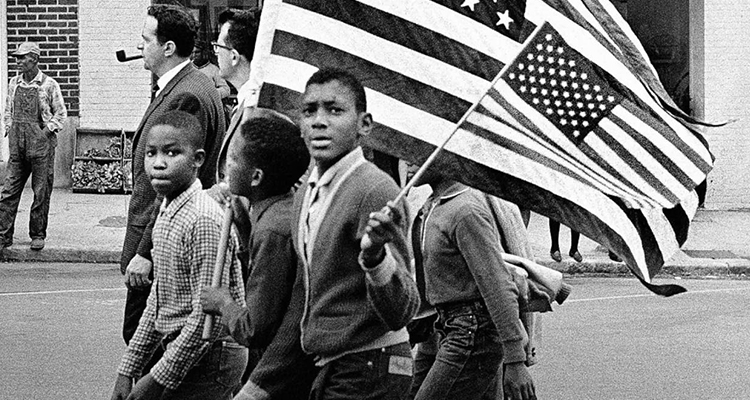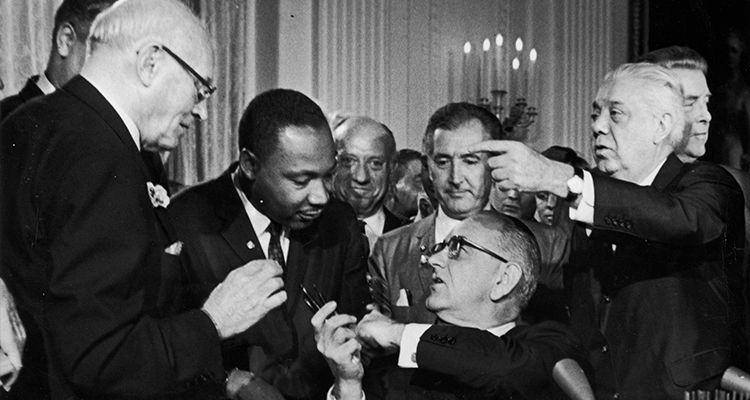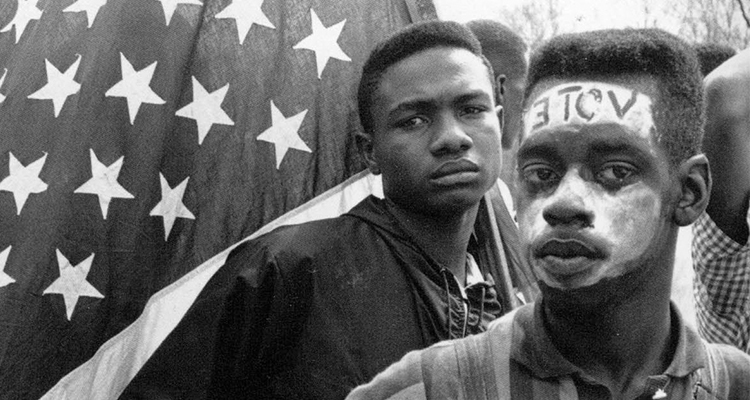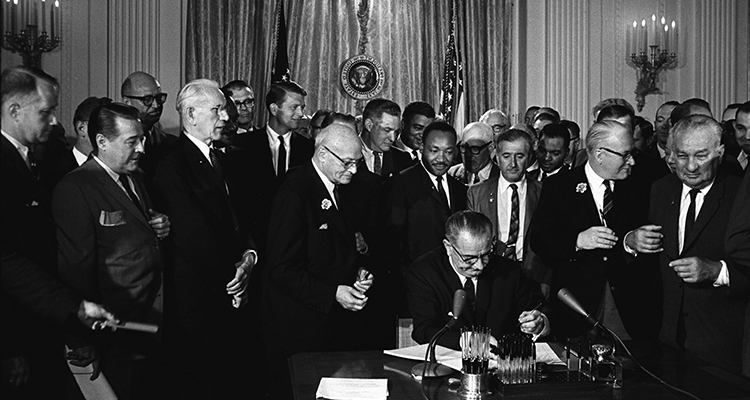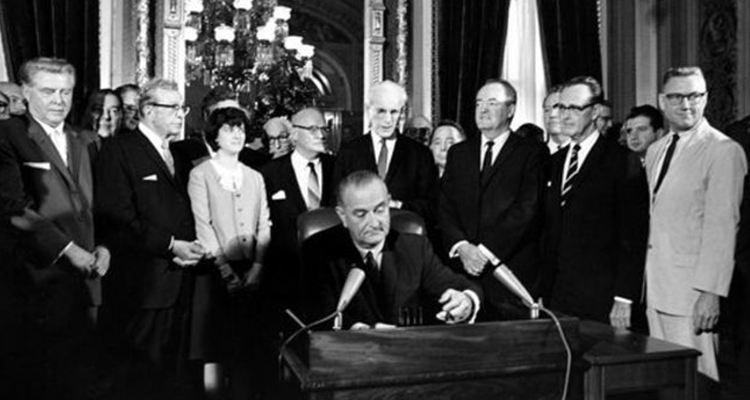Social Issue Essay Sample About Voting Rights Act of 1965 as the Litmus Paper of American Democracy
Abstract
This research paper deals with the Voting Rights Act and the events that preceded the official signing, also its role for American people, the pros and cons of having the law, the biggest winners and losers, the major players who made it possible the ratification of the bill. The research paper focuses on the events of 1965 and the preceding decade that furthered the signing. The project has an actual statistic backing, biographical information on the immediate participants, the opinions of both witnesses and the project author.
The much coveted Voting Rights Act of 1965 became a constitutionally confirmed act that granted all American citizens their undeniable right to electorally participate in the decision-making irrespective of their racial origin and ethnicity. Like any discontent-induced political concession the VRA had its proponents in people, the president, civil rights activists and adversaries in the senatorial committed conservatives. Each and every single participant shared their own responsibilities, made their unique contributions to impeding or facilitating the bill in their own right. After becoming a public issue and gaining a due attention the problem raised received its winners and losers and a proper public judgment. These days there are still pros and cons of having accomplished an equal voting privilege for all and respective consequences to be addressed next.
To start with, America or the USA was founded as the country of immense opportunities and liberty by puritan refugees who are known for having fled from the Reforming Protestant Church of England, economic poverty, social inequality, and unfairness. Strive for freedom brought them to what later came to be known as the New England. However, at some point the Whites started building their new political utopian land of opportunities on the slave labour and maltreatment of the black Africans, let alone the indigenous American Indians. What was supposed to be the political oasis for all became an utterly exploitative empire, liberty existing on paper. Paradoxically, yet the self-professed country of equals had its citizens rights pinched.
Abolitionist sentiments nurtured human anger of the Southerners that sparked the Civil War which outbreak further deepened the political schism. The strife culminated in the African Americans’ being granted their freedom and rights. Whatever the war, it never got the backbone of the system broken, without getting the double-dyed Southerners to change their attitude (Mindsparks, 2006). Moreover, the chosen group of individuals enjoyed their superiority and was maltreating the black population through 19-th century. In order for this to happen the white Southerners introduced what was notoriously tagged as the “Jim Crow” laws, a complete segregation, when the black population were denied their God-given rights and barred from decision-making failing bureaucracy created literacy tests, which were unthinkable for the blacks sidelined from high quality education, and having to pay poll taxes (Mindsparks, 2006). “No taxation without representation” once did play a vital role in American history. That was exactly what nudged the conscious part of American society to rebel in a protest.
Not until 1965 came in, did what had been for centuries in the making come into being. Voting Rights Act put a decisive end to the last stronghold of the white men’s immeasurable power, the election franchise. Once disenfranchised, people gained political relevance when everyone’s vote started counting. Once British protégé, the USA wrested its freedom in the bloody Revolutionary War back in the 18-th century, with the black population imbued their rebellious minds with the idea of the ultimate decolonization of African countries and their black population becoming a true inspiration to the American vote fighters.
Political and legislative breakthrough would have never happened save that five major players had not been actively involved in the creation of public policy, these participants being the US Senate confirming it legally, Lyndon Johnson, the then president, the guarantor, people, classically one of the biggest players being the propulsive force, and the voting rights activists in Martin Luther King and Rosa Parks, advocating the bill and lobbying it through.
Plebs, public masses or however it is that they might be called by different top-echelon officials are anything but unimportant for political transformation. Many a time throughout the history had people risen to stand up for their rights, being a formidable force to be reckon with, so did people in 1965. The violation of basic rights had both the blacks and the whites going on the streets calling for their petitions to be heeded to. Political microclimate permitting, people spilled on the streets in numbers following the Second World War, with racism, political chauvinism, Nietzsche inspired titular nation complexes its focal points (Mindsparks, 2006). Racism was a real eyesore in the then USA, to tone down the black tinges of the situation.
Never had people of the US united that voluntarily in their mutual despise to voting inequality, if only (Mindsparks, 2006). All they wanted was their rights granted to them; hence, in arranging sit-ins, creating freedom Riders cruising to Southern states by buses, marches, the notoriously known Montgomery bus boycott, to name a few, they literally forced senators into railroading and implementing the bill, not without hindrance though. Montgomery march claimed lives of prominent activists like Jimmy Lee Jackson, James Reeb and Viola Liuzzo – they paid their ultimate price for black awareness. People’s great contribution made them the most valuable player of the entire Voting Rights campaign. They became a political tool instrumental in reasoning senators into collectively signing the treaty.
There is unarguably no revolution without a leader, be it a political patriot or a people’s representative. Martin Luther King, who “had a dream,” became the one to step on the political proscenium to give the resounding problem a proper public hype. Being the voice of the voiceless, King aroused spiritual, religious, and political feelings of Americans. Martin King used to always advocate disciplined, nonviolent civil disobedience (Mindsparks, 2006). That was what differentiated him from the “Black Power” militant activists, he and his comrades had disputes with, the latter critiquing him for being indecisive and weakly opting for integrating into the white men society rather than building an independent one.
According to Mindsparks (2006), Martin Luther, in his turn, would champion and come out for the integration of blacks into the “color blind” society multiple times. It is worth thinking the way Luther King contributed to implementing the Act was by publicly addressing the compatriots about threats of living in the racially intolerant society. According to “Martin Luther King Jr. Biography” (2013), it was exactly in the shadow of Lincoln Memorial on August 28, 1963, that King made his famous “I have a dream” speech after marching past the streets of Washington, with 200,000 people in attendance. It could not but create a most powerful impression on public opinion.
Inspired by charismatic undeceiving mouthpiece public March from Selma to Alabama’s capital in Montgomery in support of the voting equality ended up with people demanding that the rights were accepted being bloodied, battled and heavily bruised by the cudgeling and tear-gassing police (“Martin Luther King Jr. Biography,” 2013). It is well-documented the bill was signed into law not until August, 1965. As of March while southern states senators were lingering over passing the bill to the Congress, people were sending a clear message about their being serious, when on the streets of big cities.
There is no better vindication than he sight of incensed people going absolutely berserk. Hence, there is no denying how huge people’s contribution was with all that bloody sacrifice. According to “Martin Luther King Jr. Biography” (2013), what was later tagged as “Bloody Sunday” saw as many as 17 demonstrators being rushed to the hospital. Suffice it to say, it was a true stroke of genius on King’s part, when his own example caused the entire procession of 2500 demonstrators to kneel in prayer avoiding further escalation when the procession was just steps away from physically confronting police during the march on March 9, 1965. His nonviolent means of protest speak volumes for the amount of responsibility that he felt bearing. Always recognized for who he was, a true champion of equality and a visionary, his ardent speech and wisdom united hundreds, most importantly, the blacks and the whites.
A 1955 bus trip became a turning point in life of Rosa Parks, yet another signee of the Voting Rights Act besides Martin Luther (“Martin Luther King Jr. Biography,” 2013). She was tried in a court hearing and fined the sum close to 15 dollars for violation of what now seems a no longer relevant ridiculous afterthought of once spiritually underachieving southern American mentality. All she did was remaining seated in the “colored bus section” even at the bus driver’s request to give up her seat for a white-skinned passenger. A craftily aired rhetoric of eloquent Luther King urged people of Montgomery, Alabama, into boycotting and an unseen riot for the woman who is now better known as the civil rights pioneer (“Rosa Parks,” 2013).
Carpooling citizens, stalled buses and crippling finances gave men in power the taste of their own medicine. Now this precedent is rightfully considered a huge milestone of the civil rights movement. Rosa Parks displayed transportation inequality as a true problem, one of many in a huge list of segregation issues. In doing so, she got a huge political momentum heading into turbulent 1960s. She is even said to have passed the literacy test and paid the poll tax to receive the insulting voting right. The felicity of phrase and elocutionary gift made her multiple times activist of people’s marches and demonstrations in support of civil rights, including that of voting (“Rosa Parks,” 2013). Her defiance becoming an incentive and her being among signees of the revolutionary Voting Rights Act make her one of the most important figure of the movement. The truth is her immense contribution can hardly be overestimated, with Parks activity being symbolic and exemplary.
The activity and contribution of the civil rights activists and people being on public basis, the then president Lyndon Johnson still had the final say on whether or not to confirm the bill. It was a surprising move, his supporting the bill, considering the previous attitude of the Texan before assuming presidential reins of power (Keko, 2011). To woo political support or act for noble causes Johnson’s decision still remains debatable. Never a civil rights advocate, the Democrat started building towards its judicial legalization, doing what his assassinated precursor never did. According to Keko (2011), it is to Johnson’s efforts that Barack Obama owes his being the president of the US.
Worshipping Roosevelt and wanting to build up a political legacy of his own, Lyndon Johnson about-turned taking a different stance. He had plenty of tools from bullying and arm-twisting to flattering at his disposal to make it happen the law enforcement. According to Keko (2011), before confirming the Voting bill Johnson got northern Democrats and Republicans to unite only to pass the anti-segregation Civil Rights Act of 1964, giving the opening for the mentioned Voting law.
Enfranchising, the Voting Rights Act eliminated literacy tests. Besides, many African Americans would become mayors of large cities, senators and Congress members. While winning the voting support of the black population, Johnson was losing southern voters. His democratic aspirations were not much welcomed by the blacks, seeing little-to-no actual life improvements, demonstrators taking to the streets. This miscalculation might have cost Johnson his office; still not only did he appease the discontent, but he also continued clothing African Americans with their rights. Though his popularity got on the ebb with the Vietnam War, he remains the major figure in the legislation confirmation. It is every president’s duty to oversee the implementation of law. Such was another personal contribution of the president who became the controlling guarantor of the law.
It is safe to say, before being inked by the president any bill needs senatorial approval. Before traveling to Congress and the table of president the bill required a senate discussion and endorsement. The supreme bill supporter, President Lyndon Johnson was a Democrat, thus he had a strong backing and firepower from democrats. Both hemorrhaging parties, however, incurred strong party-switching casualties during the events of 1965. The group of American legislators was not quick at giving the bill the green light. It will be wise to admit this selected group of lawmakers was southerners of origin.
South was where racial discrimination was still flourishing around 1965, which means the bill was destined to be halted by an obstruction for quite some time, with senators trying to highlight the possible implications and ramifications of the bill, not wanting any color political rotations and power balance changes. Their almost Roman Cato-like “Cartage must be destroyed” speeches had people be out on the streets in rage. Some went as far as to declare the bill to violate the Magna Carta, the Declaration of Independence, the Constitution, and the Bill of Rights. Strong was the anti-bill desire of certain southern senators gossiped to belong to the Ku Klux Klan, the radical violent white supremacy movement, which third wave was reactionary to the civil and voting rights movement (The Road to Civil Rights).
However, the filibustering senators saw little use in opposing to what was to happen, no matter what. According to Roberts (1982), certain opposing senators were trying to push amendments through. The amendments would have diluted the bill, if accepted, continuing the line of voting discrimination. It was John East, a North Carolina Republican, who tried it utmost to introduce the amendments. Senator Helms was holding the line of defense attacking the bill for the whole week, Senator Orrin Hatch, the Utah Republican, also surrendered after multiple futile attempts (Roberts, 1982).
Helms had nothing to do but give up trying in vain only to push his other bills that would have been in jeopardy, had he continued in the same vein. What did work was Senator Baker’s giving Helms a full-scale floor debate on the abortion issue as a tradeoff. After hours and days of cloture the ayes had “finally” had it. The bill passed the Senate on May 25 by a vote of 77 to 19, with 47 Democrats and 30 Republicans in support and 17 Democratic party-switchers and 2 Republicans opposed (The Road to Civil Rights). As can be inferred from statistics, the power of word, numerous gambits, a hard contribution of patriotically-inclined senators, and the need for changes made the bill an official law.
“They the People” made it official, the black people’s exercising the voting rights which also has its own intended or unintended consequences. Johnson’s legislation culminated in African Americans’ being granted government service opportunities, voting rights, which was predictable, increasing the number of black voters up to 60 percent, with no literacy tests or poll taxes required any longer. It also had south abandon the Democratic Party in terms of political realignment and regrouping while African Americans were seen abandoning the Republican Party, which was rather an unintended outcome (Keko, 2011). African Americans’ being elected mayors and high-ranking officials, senators at such a high pace was also hardly anticipated. White supremacy sentiments still reigning around 2009, Barack Obama was still pretty unlikely to be elected president in the wake of Voting Rights Act; still, it was smart of American electorate to have made that choice in favor of both crisis and terrorism fighter.
The black population can be rightfully considered the biggest winners, coming from voting battle victorious, considering they became fully-enfranchised equal citizens of the proud country. Southern Senators who had prior practiced employment, public service infringements, educational restrictions, political pitchforking, and jobbing the white politicians into positions had to conciliate with having the black in the big politics picture. Political activists as Rosa Parks and Martin King also won, though the latter was unceremoniously assassinated. Lyndon Johnson never became Franklin Roosevelt of American politics in the long run, his career seeing a relative slowdown; still, he went down in the annals of history as the biggest supporter and contributor to the Voting Rights Act.
Speaking of effectiveness, it will be wise to say the policy did work; it is still working, having stood the test of time. The pros of having ratified the bill go without saying, since the country of equals made this equality for all regardless of ethnicity nuances while the cons were obvious to southern states only, having to share political and social privileges with their black compatriots from then on no longer being able to gerrymander the unfair majority.
Conclusion
Voting Rights Act became a real outlet for African Americans suffocating in the racially intolerant society, dying for changes. In 1965 changes did come in thanks to valiant efforts of people, whose bloody contribution became contestably the sole reason for senators to legislate the bill. There was no easing the tensions between power and people who would not have their rights infringed except for the bill ratification. The bill would find a strong opposition in senators from southern states, airbrushing racism and stonewalling the bill. The then President Lyndon Johnson also became an active participant dropping his former ante-presidential views, siding with rebellious fighters.
If it had not been for the personal input and heroism of public activists like Martin Luther King and Rosa Parks, the Act would not defend voting rights these days. Their dogged determination and passionate speeches delivered urgent messages, arousing the slumbering human consciousness and getting both blacks and whites to come to terms on the issue to fight in a joint concerted effort by marching across the streets in support of the bill, arranging sit-ins and canvassing the supporters in southern states. Discrimination in favor of the whites ultimately ended in 1965 with the official signing of the resolution into law by Lyndon Johnson, which became a real breakthrough for the country of freedom and opportunities for all.
